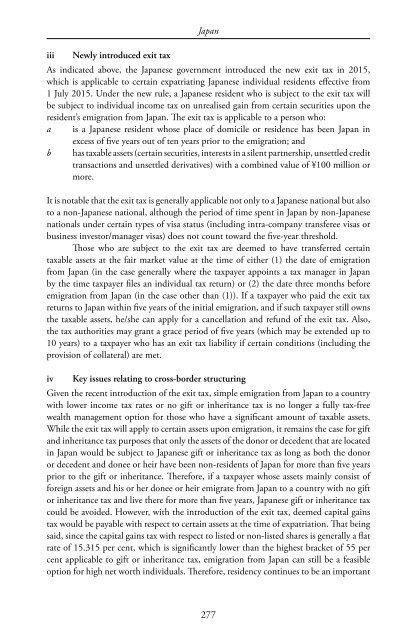The Private Wealth & Private Client Review
20151019-103922
20151019-103922
You also want an ePaper? Increase the reach of your titles
YUMPU automatically turns print PDFs into web optimized ePapers that Google loves.
Japan<br />
iii Newly introduced exit tax<br />
As indicated above, the Japanese government introduced the new exit tax in 2015,<br />
which is applicable to certain expatriating Japanese individual residents effective from<br />
1 July 2015. Under the new rule, a Japanese resident who is subject to the exit tax will<br />
be subject to individual income tax on unrealised gain from certain securities upon the<br />
resident’s emigration from Japan. <strong>The</strong> exit tax is applicable to a person who:<br />
a is a Japanese resident whose place of domicile or residence has been Japan in<br />
excess of five years out of ten years prior to the emigration; and<br />
b has taxable assets (certain securities, interests in a silent partnership, unsettled credit<br />
transactions and unsettled derivatives) with a combined value of ¥100 million or<br />
more.<br />
It is notable that the exit tax is generally applicable not only to a Japanese national but also<br />
to a non-Japanese national, although the period of time spent in Japan by non-Japanese<br />
nationals under certain types of visa status (including intra-company transferee visas or<br />
business investor/manager visas) does not count toward the five-year threshold.<br />
Those who are subject to the exit tax are deemed to have transferred certain<br />
taxable assets at the fair market value at the time of either (1) the date of emigration<br />
from Japan (in the case generally where the taxpayer appoints a tax manager in Japan<br />
by the time taxpayer files an individual tax return) or (2) the date three months before<br />
emigration from Japan (in the case other than (1)). If a taxpayer who paid the exit tax<br />
returns to Japan within five years of the initial emigration, and if such taxpayer still owns<br />
the taxable assets, he/she can apply for a cancellation and refund of the exit tax. Also,<br />
the tax authorities may grant a grace period of five years (which may be extended up to<br />
10 years) to a taxpayer who has an exit tax liability if certain conditions (including the<br />
provision of collateral) are met.<br />
iv Key issues relating to cross-border structuring<br />
Given the recent introduction of the exit tax, simple emigration from Japan to a country<br />
with lower income tax rates or no gift or inheritance tax is no longer a fully tax-free<br />
wealth management option for those who have a significant amount of taxable assets.<br />
While the exit tax will apply to certain assets upon emigration, it remains the case for gift<br />
and inheritance tax purposes that only the assets of the donor or decedent that are located<br />
in Japan would be subject to Japanese gift or inheritance tax as long as both the donor<br />
or decedent and donee or heir have been non-residents of Japan for more than five years<br />
prior to the gift or inheritance. <strong>The</strong>refore, if a taxpayer whose assets mainly consist of<br />
foreign assets and his or her donee or heir emigrate from Japan to a country with no gift<br />
or inheritance tax and live there for more than five years, Japanese gift or inheritance tax<br />
could be avoided. However, with the introduction of the exit tax, deemed capital gains<br />
tax would be payable with respect to certain assets at the time of expatriation. That being<br />
said, since the capital gains tax with respect to listed or non-listed shares is generally a flat<br />
rate of 15.315 per cent, which is significantly lower than the highest bracket of 55 per<br />
cent applicable to gift or inheritance tax, emigration from Japan can still be a feasible<br />
option for high net worth individuals. <strong>The</strong>refore, residency continues to be an important<br />
277


